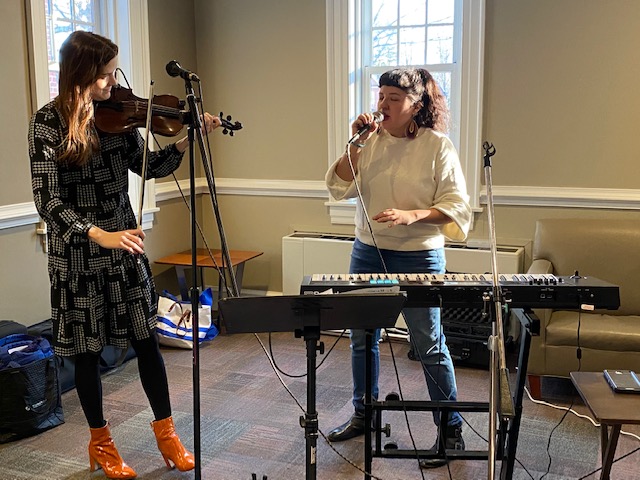Guilford hosts second annual Shifting Worlds institute
On Friday, Jan. 17, Guilford’s Gilmer Room was host to the second annual institute “Shifting Worlds: Displacement and Forced Migration in Modern Times.” The conference, sponsored in collaboration with Elon University and UNCG, brought together a wide range of speakers to address immigration and refugee issues in the United States, with a specific focus on mental health.
Shifting Worlds included presentations from some of Guilford’s own students, including seniors Daisy Arguello and Raina Baier as well as junior Hsar Ree Ree Wei, a Community and Justice Studies major. Guilford professors Diya Abdo, Mark Justad and Christian Matheis also participated in the event as moderators.
For Guilford graduate and Every Campus a Refuge (ECAR) Program Coordinator Kathleen Herbst, having Guilford host such an informative event was extremely important.
“Hosting the conference … was an incredible opportunity for us to show our school and its programs to the Greensboro community. Attendees, which primarily consisted of people outside Guilford, got the chance to see our campus, engage with student presentations and meet our community.”
The conference went from 9:00 a.m. to 5:00 p.m. and was roughly broken into four sections.
The morning session consisted of presentations from doctors, like Shruti Simha, lawyers, like Margaret H. Taylor and fellow experts on mental health and immigration. The lunch session gave students like Arguello and Baier the opportunity to share their own research and perspectives on the issues discussed. The afternoon session consisted of first-hand stories from refugees and immigrants. Lastly, there was a reception in which Latinx singer Quilla performed songs “inspired by themes of migration,’’ according to the event’s speaker bios.
Annika Norris, a senior English major and ECAR intern, was strongly impacted by the morning presentations, particularly Simha’s, which focused on children’s mental health in regards to the stress of being in refugee camps.
“(She) looked at a study that showed how toxic stress can cause irreparable damage on a child’s brain. We looked at scans of a healthy brain versus a child’s brain who had experienced toxic stress over a period of time, and it looked as though there were actually holes in the brain.”
Norris was also struck by what the conference taught her about detention centers and immigration policies in the U.S.
“There are policies directly affecting refugees in the U.S., which are decided by the president. In 2016 it was 85,000 who were let in and resettled. This year the cap is 18,000. It has significantly decreased since the Obama administration.”
This means more crowding in detention centers and more exposure of children to things like toxic stress, which Simha’s studies show has long term, negative mental health effects.
Guilford student Wei was able to both attend and speak at the event, which to her was like a breath of fresh air.
“The highlight for me was actually hearing from different types of researchers and lawyers about immigration stories and how inclusive this event was in terms of the type of groups that they covered … this is the first conference I’ve actually attended that addresses people from where I came from, which is Burma and Thailand … current refugees who had lived there haven’t been able to be on the radar. I’m glad that people are talking about it.”
Wei presented in the last half of the conference, where she told her personal stories as a refugee and child growing up in America.
“I mainly wanted to focus on the long term effects on refugee children … Other refugees (at the conference) were much older and able to speak on the process of getting to the United States and what their lives were like before then.”
She continues to relay these long term effects.
“We are trying to maintain our native culture, but at the same time are essentially assimilated. Finding that balance can lead to mental depression. The American expressions say ‘Oh, be independent, you have this will to do that’, but at the same time there’s cultural constraints and barriers. I wanted to be able to highlight that for folks.”
Wei was very pleased with the conference’s capacity to allow a wide variety of ideas to be heard, including her own.
“One of the lawyers … really highlighted that when we think of undocumented folks at the border, it’s not just Hispanics … There’s so much negative spotlight on undocumented Hispanics and Latinx, when clearly there’s a lot more folks who are not of that identity.”
The event was able to not only address these issues but brainstorm plans to resolve them. According to Herbst, this was one of the strongest aspects of the conference.
“Many of the presentations were local and specific to our region. We had specific action items, such as responding to the new proposed rules that would further limit requirements for asylum seekers. People left feeling not only more aware, but energized to act and work towards change.”
Given the success of this second annual conference, there will likely be a third in 2021, hosted by either Elon University or UNCG. Those who are interested in learning about immigration issues here in the United States and how to combat them are encouraged to attend.
Editor’s note: This story originally was published in Volume 106, Issue 9 of The Guilfordian on Jan. 24, 2020.






